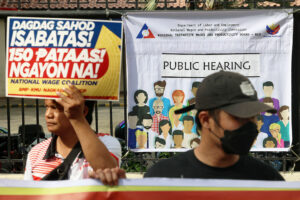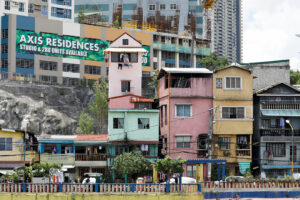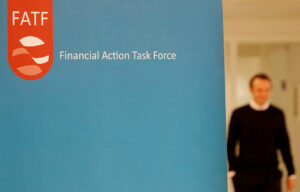By Chloe Mari A. Hufana
A GROUP of Philippine textile exporters on Thursday asked the local wage board to delay a proposed wage increase in the National Capital Region (NCR) by a year, saying they have yet to fully recover from losses caused by the pandemic.
This as the Regional Tripartite Wages and Productivity Board – National Capital Region (RTWPB-NCR) on Thursday concluded its first and last public hearing for the proposed wage hikes, which ranged from P100-P750.
“The final part will be wage deliberations. Here, we will discuss the basis for a wage increase and what will justify the amount of the increase,” Board Chairperson Sarah Buena S. Mirasol told reporters after the public hearing.
The wage board is set to release its decision on or before July 20, the anniversary of the last wage order in the capital region.
The daily minimum wage in NCR is P610 for nonagriculture and P573 for agriculture, service/retail establishments with 15 workers or less, and manufacturing establishments regularly employing fewer than 10 workers.
At the hearing, the Confederation of Wearable Exporters of the Philippines (CONWEP) sought a one-year moratorium on wage hikes in NCR saying the garments export industry is still struggling.
A one-year moratorium would allow exporters to fully recover and preserve the jobs of factory workers until orders stabilize by 2025, CONWEP Associate Director Rosette D. Carillo said.
“Major global markets like the US and EU are buying less [and] this is expected until 2025. Orders are coming in less and lower prices are impacting our industry’s exports, with a downward trend since 2022. Based on our members’ survey, exports are projected to further decline by 11% this year,” she told BusinessWorld in a text message.
Ms. Carillo said any wage increases this year would drive up business costs, which may force manufacturers to shed jobs.
“Our members are challenged with fewer orders to maintain operations in the country… The migration of orders already experienced before might continue and lead to more job losses,” Ms. Carillo added.
Rizal Commercial Banking Corp. Chief Economist Michael L. Ricafort told BusinessWorld the one-year moratorium on wage hikes could help ease inflationary pressures.
He noted there are second-round inflationary effects whenever there are wage hikes, as some businesses pass on these costs to consumers by raising selling prices.
Meanwhile, Renato B. Almeda, an Employers Confederation of the Philippines (ECoP) governor, told the same public hearing its members could only afford a P15-P16 increase in the daily minimum wage.
In an interview with BusinessWorld, Butch C. Guerrero, another ECoP governor, said a P15 hike in daily wages for agricultural workers and P16 for nonagricultural workers are the appropriate increases considering inflation.
“We need to align workers’ salaries with the consumer price index,” he said in Filipino.
The NCR wage board is expected to set the tone for the wage increases in other regions.
Calixto V. Chikiamco, president of the Foundation for Economic Freedom, warned that high minimum wages may drive foreign companies away.
“High minimum wages have already driven away many foreign companies, especially labor-intensive ones like garments and light manufacturing, which have fled to Vietnam and Bangladesh,” he told BusinessWorld in a Viber message.
“Evidence of this is that manufacturing as a percentage of GDP (gross domestic product) has been shrinking. However, aside from high minimum wages, unreasonable labor security regulations have also made climate of investments to investors, foreign or local, inhospitable,” he added.
However, labor groups called for wage hikes, slamming the claims of employers that it will stoke inflation.
“[We] blast the scaremongering excuse of employers and even no less than the Department of Labor and Employment that any wage hike will supposedly lead to massive inflation, unemployment, business closures, and economic slowdown — only because they do not want to pay the workers their fair share,” the National Wage Coalition said in a statement on Thursday.
Former lawmaker and chairman of Partido Manggagawa Renato B. Magtubo told BusinessWorld on the sidelines of the public hearing that foreign investors consider the overall cost of doing business, including the availability of skilled workers and raw materials.
“I don’t think wages are a significant factor for investors to come in. What they look at is the overall cost. When producing a product, the wage is just one factor in the unit cost. They also consider whether there is a market, and if there is stability. So, wages are not the main factor in attracting investors,” he said in Filipino.
Filomeno S. Sta. Ana, III, coordinator for Action for Economic Reforms, echoed the sentiment, emphasizing that companies look for skills rather than labor costs.
“In this day and age, investors will give premium to workers with skills and high productivity. China, Vietnam, are attracting investments not because of their cheap labor but because of the skills and productivity of their workforce,” he said in a Viber message.
“In some low-wage countries, workers are compensated with non-wage benefits in terms of cheaper food, cheaper housing, access to healthcare, and other social protection measures,” he added.





